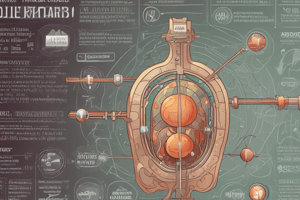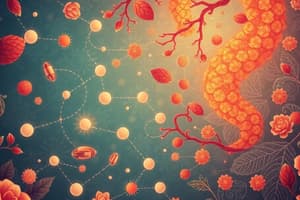Podcast
Questions and Answers
What percentage of drugs in clinical usage today are oxidised by CYP3A4?
What percentage of drugs in clinical usage today are oxidised by CYP3A4?
- 30%
- 50% (correct)
- 70%
- 90%
What is the primary factor that influences drug formulation when drugs cross biological membranes?
What is the primary factor that influences drug formulation when drugs cross biological membranes?
- Route of administration (correct)
- Lipid solubility of the drug
- pH of the biological membrane
- Tissue effects of the drug
What is the base unit for glucuronidation in Phase II metabolism?
What is the base unit for glucuronidation in Phase II metabolism?
- Fructose-1-phosphate
- Glucose-1-phosphate (correct)
- Galactose-1-phosphate
- Glucose-6-phosphate
Why are basic or acidic groups useful in drug design?
Why are basic or acidic groups useful in drug design?
What is the effect of depleting the GSH pool in glutathione conjugation?
What is the effect of depleting the GSH pool in glutathione conjugation?
What is the primary application of the theory of volume of distribution (VD)?
What is the primary application of the theory of volume of distribution (VD)?
What is the effect of metabolism on drugs?
What is the effect of metabolism on drugs?
What is the primary focus of the learning outcome 'Explain how drugs cross the biological membrane by different routes and how this influences drug formulation'?
What is the primary focus of the learning outcome 'Explain how drugs cross the biological membrane by different routes and how this influences drug formulation'?
What determines the net effect of renal excretion?
What determines the net effect of renal excretion?
What is the primary benefit of applying knowledge of drug design modification to improve penetration of target tissue?
What is the primary benefit of applying knowledge of drug design modification to improve penetration of target tissue?
What is the effect of multiple metabolic pathways on a single molecule?
What is the effect of multiple metabolic pathways on a single molecule?
What is the primary reason why ADME is important in drug development?
What is the primary reason why ADME is important in drug development?
What is the primary factor that determines the glomerular filtration rate?
What is the primary factor that determines the glomerular filtration rate?
What is the significance of the fraction of unbound drug in plasma in glomerular filtration?
What is the significance of the fraction of unbound drug in plasma in glomerular filtration?
What is the primary route of excretion for drugs that are not excreted via the kidney?
What is the primary route of excretion for drugs that are not excreted via the kidney?
What is the consequence of changes in the amount of plasma protein on glomerular filtration?
What is the consequence of changes in the amount of plasma protein on glomerular filtration?
What is the result of displacement from plasma protein by other drugs?
What is the result of displacement from plasma protein by other drugs?
What is the characteristic of the hepatic sinusoids that enables first-pass metabolism?
What is the characteristic of the hepatic sinusoids that enables first-pass metabolism?
What is the primary function of the hepatic vein in the context of drug metabolism?
What is the primary function of the hepatic vein in the context of drug metabolism?
What type of transport is involved in liver excretion, as well as kidney route?
What type of transport is involved in liver excretion, as well as kidney route?
What is the term for the process by which a drug is reabsorbed into the bloodstream after being excreted into the bile?
What is the term for the process by which a drug is reabsorbed into the bloodstream after being excreted into the bile?
Which of the following references is NOT a primary source for the topic of drug metabolism?
Which of the following references is NOT a primary source for the topic of drug metabolism?
What is the term for the process by which the liver metabolizes a drug before it reaches the systemic circulation?
What is the term for the process by which the liver metabolizes a drug before it reaches the systemic circulation?
Which of the following is a type of enzyme involved in drug metabolism?
Which of the following is a type of enzyme involved in drug metabolism?
What is the primary mechanism by which P-glycoprotein confers multidrug resistance in tumors?
What is the primary mechanism by which P-glycoprotein confers multidrug resistance in tumors?
What is the primary application of nanomedical solutions in the context of multidrug resistance?
What is the primary application of nanomedical solutions in the context of multidrug resistance?
What is the primary role of CYP3A4 enzymes in the context of drug metabolism?
What is the primary role of CYP3A4 enzymes in the context of drug metabolism?
What is the primary consequence of multidrug resistance in cancer therapy?
What is the primary consequence of multidrug resistance in cancer therapy?
What is the primary factor contributing to the development of multidrug resistance in cancer cells?
What is the primary factor contributing to the development of multidrug resistance in cancer cells?
Plasma binding protein increases pharmacological action of a drug
Plasma binding protein increases pharmacological action of a drug
Increased volume of distribution indicates poor distribution of a drug throughout the body
Increased volume of distribution indicates poor distribution of a drug throughout the body
The primary role of albumin is to maintain colloidal osmotic pressure of blood
The primary role of albumin is to maintain colloidal osmotic pressure of blood
Metabolism of a drug always leads to its activation
Metabolism of a drug always leads to its activation
Glomerular filtration rate is the primary factor that determines the rate of excretion of a drug
Glomerular filtration rate is the primary factor that determines the rate of excretion of a drug
Displacement of other drugs from plasma protein can increase their pharmacological action
Displacement of other drugs from plasma protein can increase their pharmacological action
Rifampicin is a substrate of CYP3A4.
Rifampicin is a substrate of CYP3A4.
Glucuronidation requires inorganic sulphate.
Glucuronidation requires inorganic sulphate.
Glutathione conjugation is a high energy conjugate reaction.
Glutathione conjugation is a high energy conjugate reaction.
The liver is a minor route of excretion.
The liver is a minor route of excretion.
Tubular re-absorption is a passive process.
Tubular re-absorption is a passive process.
GST conjugates can be used as a marker of efficacy.
GST conjugates can be used as a marker of efficacy.
Dr. Sarah Bailey's consultation hours are on Wednesdays from 14.00 - 15.00.
Dr. Sarah Bailey's consultation hours are on Wednesdays from 14.00 - 15.00.
The theory of volume of distribution (VD) is used to identify the best therapy.
The theory of volume of distribution (VD) is used to identify the best therapy.
Basic or acidic groups are not useful for improving drug absorption.
Basic or acidic groups are not useful for improving drug absorption.
The primary focus of the learning outcome is on the excretion of drugs.
The primary focus of the learning outcome is on the excretion of drugs.
ADME is not important in drug development.
ADME is not important in drug development.
Lipid solubility does not affect drug absorption or efficacy.
Lipid solubility does not affect drug absorption or efficacy.
Glomerular filtration is a dependent process.
Glomerular filtration is a dependent process.
Large molecules (Mr >300) are often eliminated via the kidney.
Large molecules (Mr >300) are often eliminated via the kidney.
Changes in the fraction of unbound drug can affect the rate of liver elimination.
Changes in the fraction of unbound drug can affect the rate of liver elimination.
Expression levels of drug transporters can change rapidly due to genetic mutations.
Expression levels of drug transporters can change rapidly due to genetic mutations.
The hepatic sinusoids are responsible for first-pass metabolism due to their characteristic of being nutrient-poor.
The hepatic sinusoids are responsible for first-pass metabolism due to their characteristic of being nutrient-poor.
Liver excretion is a type of active transport.
Liver excretion is a type of active transport.
Enterohepatic recirculation is a process where the liver excretes the drug and it gets reabsorbed into the bloodstream.
Enterohepatic recirculation is a process where the liver excretes the drug and it gets reabsorbed into the bloodstream.
The hepatic artery is responsible for carrying oxygenated blood to the liver.
The hepatic artery is responsible for carrying oxygenated blood to the liver.
Glutathione S-transferases are involved in antioxidant defenses and xenobiotic metabolism.
Glutathione S-transferases are involved in antioxidant defenses and xenobiotic metabolism.
The Erythromycin Breath Test is used to predict the volume of distribution of a drug.
The Erythromycin Breath Test is used to predict the volume of distribution of a drug.
P-glycoprotein is involved in the efflux of drugs from the liver.
P-glycoprotein is involved in the efflux of drugs from the liver.
The portal vein carries deoxygenated blood from the liver to the heart.
The portal vein carries deoxygenated blood from the liver to the heart.
Flashcards are hidden until you start studying
Study Notes
CYP3A4 - Phase I Enzyme
- CYP3A4 is the most abundant P450 in human liver, responsible for oxidizing >50% of drugs in clinical usage today
- It has a very wide substrate specificity
- Rifampicin and Metyrapone are examples of inducers of CYP3A4
Phase II Metabolism
- Phase II metabolism involves the addition of conjugates to increase hydrophilicity, resulting in a more polar metabolite that can be easily excreted
- Glucuronic acid, sulphate, amino acids, glutathione, and acetylation are common conjugates used in Phase II metabolism
- Multiple different enzymes are involved in Phase II metabolism, and these enzymes are inducible
- The goal of Phase II metabolism is to produce a metabolite that is polar enough to be excreted via urine or faeces
Types of Phase II Metabolism
Glucuronidation
- Glucuronidation is a high-energy conjugate reaction that uses glucose-1-phosphate as a base unit
- It is a ubiquitous and highly expressed reaction in most species, except for cats
- Glucuronidation is important in enterohepatic recirculation
Sulphation
- Sulphation has a similar substrate profile to glucuronidation
- It is a high-energy conjugate reaction that may be limited by inorganic sulphate availability
- Sulphation has a large variability in species and tissue expression
Glutathione Conjugation
- Glutathione conjugation involves the tripeptide Glu-Gly-Cys (GSH)
- It is a low-energy conjugate reaction that is specific for halides and epoxides
- GSH is ubiquitous and has a good conjugate pool, with both cytosolic and membrane-bound variants
- Depletion of GSH pool can lead to toxicity, and GST conjugates may be a marker of toxicity
Multiple Possibilities
- Metabolism can occur at multiple sites within one molecule
- Metabolism can activate or deactivate drugs, and the balance determines the outcome
- Cyclophosphamide is an example of a drug that is activated in the liver, resulting in no adverse effects in the GIT
Excretion
- Excretion is the final clearance of drugs from the body
- It is also the final chance to keep drugs in the body
- Metabolism, kidney, liver, and GI tract are the major routes of excretion
- Lungs, sweat, lacrimal fluid, and milk are minor routes of excretion
Renal Excretion
- Renal excretion is the net effect of glomerular filtration, tubular secretion, and tubular re-absorption
- These processes are both passive and active
- Multiple factors affect the rate of elimination, including kidney integrity, molecule size, urine flow, urine pH, and other compounds being excreted
Glomerular Filtration
- Glomerular filtration is a passive process dependent on hydrostatic pressure gradient
- It has a size cut-off, allowing small molecules (most drugs) to pass through while removing plasma proteins
- Filtration is dependent on the free drug in plasma, and changes in the fraction of unbound drug may change the rate of renal elimination
Liver Excretion
- Liver excretion is generally the route for drugs not excreted via the kidney
- Large molecules (Mr >300) are often excreted via the liver, and may involve glucuronide conjugates
- Liver excretion can be transporter-mediated, and may involve enterohepatic recirculation
Studying That Suits You
Use AI to generate personalized quizzes and flashcards to suit your learning preferences.




